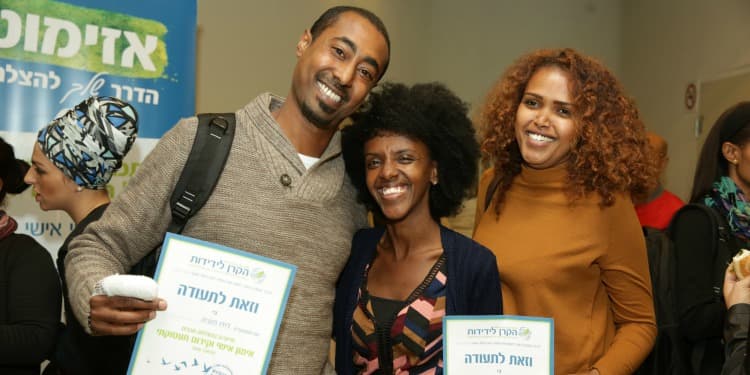Project Spotlight: Azimut Program
The Fellowship | July 25, 2017

The Fellowship‘s Azimut program is for young adults in Israel between the age of 21 and 35 who were raised in low income families and struggle financially in adulthood. Our project coordinators conduct regular sessions with members of the program who need help with job mentoring, financial planning, and life-management skills. In the following story, The Fellowship‘s Ami Farkas meets one young man in our Azimut program who makes a change that helps his whole community.
Opher’s parents were some of the first Ethiopian Jews who made aliyah in the 1980s. Being part of the Ten Lost Tribes coming from the tribe of Dan, the Ethiopian Jewish community and their return to Israel represent a very important step forward in the unfolding of prophesy.
Opher is the oldest of three sons and the leader of the family. And like many young Israeli-born Ethiopians whose parents risked their lives to journey to the Holy Land, he was raised with a great sense of responsibility to make a successful life for himself in Israel.
“It’s difficult for young Ethiopians to succeed,” Opher explains. “Many come from poor families and rough neighborhoods. Their parents were raised in Ethiopia where life was very different than in Israel. These parents are often at a loss in trying to help their kids with school; they do not know how to prepare their children mentally and physically for army service, and can provide only minimal advice and guidance for the challenges they will face after the army. Many of them don’t even know how to read Hebrew. Not only are the parents unable to guide us; often they are in need of us guiding them.”
Upon completing three years of IDF service, where Opher served in an elite engineering combat unit, he came back to his neighborhood, a community made up largely of Ethiopians. “I drove around the neighborhood and I felt hopelessness in the air; I saw the poverty which I grew up with. Yet now after finishing the army, I had more of an objective view. I saw the despair in young men’s eyes, as though this misery is the only life we know, and the only life we will live.”
The scenes from the old neighborhood had a very deep impact on Opher and he felt he had to do something to help the youth in his community. The problem was that he too suffered from the same insecurities and despair; the same feeling that he too is doomed to live in poverty and never fulfill his dreams.
“About two years ago I met a representative from The Fellowship’s Azimut project,” Opher recalls. Azimut had just started operating in his neighborhood, and so Opher decided to give it a shot. “I had nothing to lose.”
During his initial meetings with The Fellowship, Ophir opened up about his dreams and insecurities. Through counseling, Opher began to understand that the only thing that stood in the way of him realizing his potential was fear.
“My meetings with The Fellowship began to help me let go of my fears and insecurities. I realized that my fear of not succeeding was paralyzing me, and with The Fellowship behind me, I now felt strong, secure, and confident.”
Opher’s dream was to start a project aimed at helping teenagers in his neighborhood. He wanted to take his life experience, as well as the training he received in the army, and help young Ethiopian boys and girls realize their own potential and dreams.
“There was too much despair in my neighborhood. Teenagers were talking about getting discharges from the army, and almost none of them dreamed or hoped for a career.”
The Fellowship counselor helped Opher realize that he had the tools and the personality to make a difference in his neighborhood. The counselor also helped Opher develop a strategic plan for the project he wanted to develop, and within a few months of meeting with The Fellowship representative Opher began his project.
“Thanks to The Fellowship I began to believe in myself and in what I am able to achieve,” Opher says. Opher now works with groups of teens in his neighborhood. He trains them physically for the army, mentors many teenagers, offers guidance in school, and most importantly he gives them hope.
“I could have never done this without The Fellowship, and I am incredibly thankful for the help and guidance I received.”
